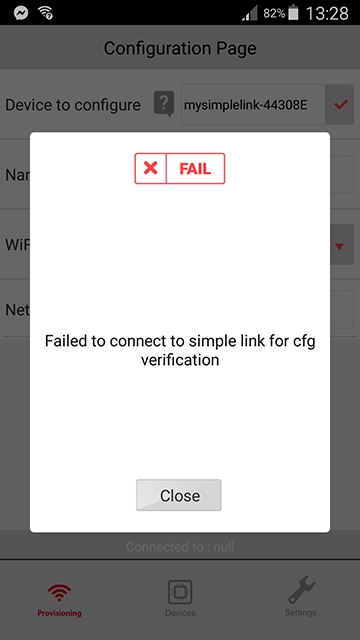Other Parts Discussed in Thread: SYSCONFIG
Tool/software: Code Composer Studio
I 'm doing the usual MQTT example but having a problem with including provisioning to my RTOS main task. This is what error i get:
Note,the many "[NETAPP EVENT] IP leased to a client" are due to me connecting and disconnecting with the smartphone prior to doing provisioning. Even though the startProvisioning API returns -3 (I suppose it's TIMEOUT?), the profile is sometimes actually added and i can see it in the device's webserver. In the smartphone side,this is what i see:
The project and the dependencies have been set to OS_DEBUG and debug configurations. Things i've tried:
- The functions generalTimeoutHandler,waitmSec, timeoutHandler, ProvEventTimeoutHdl ,ProvWaitHdl that need to be defined in MAIN for the provisioning to work. I made sure i;m not using the timers A1 and A0 anywhere else at the same time.
- Added USE_TIRTOS,SL_PLATFORM_MULTI_THREADED to my project's and also the provisioninglib project's predefined symbols.
- Other configurations than OS_DEBUG. In some the program doesn't work at all.
- Made sure that the following lines are included in the "Simplelink/user.h": #include "provisioning_api.h", #define SL_EXT_LIB_1 sl_Provisioning
- Tried the same things with a totally different project using FREE RTOS. Same outcome.
- One weird thing i've noticed is that the CCS has copied the projects wlan_station, driverlib, and simplelink, to the workspace although the "getting started" instructions say it shouldn't and i had disabled the option when importing. Maybe i'm setting the configurations to the wrong projects? These projects are in my workspace now. These are my linker includes:
Please help. Alex


